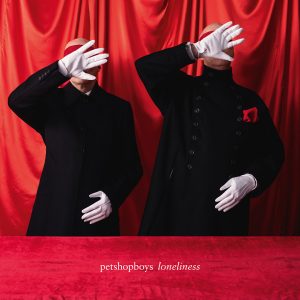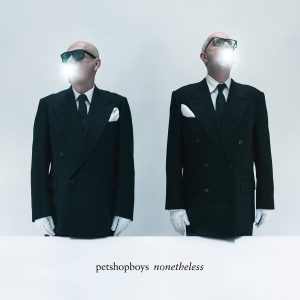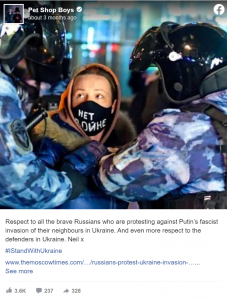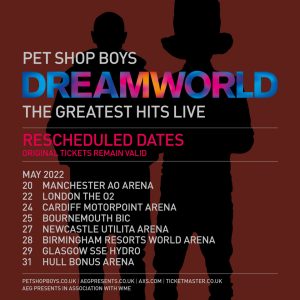Mary Wakefield meets the successful pop duo
the Pet Shop Boys, and finds them eloquent
critics of New Labour, staunch defenders of
civil liberties and fans of Vince Cable
Through the woods, the trees
And further on the sea
We lived in the shadow of the war
Sand in the sandwiches
Wasps in the tea
It was a free country
In a West End town in a dead end world OK, no: in a nice Georgian townhouse in central London, on the top floor where once boot boys bedded down, the Pet Shop Boys are revisiting their past. The Britain of my childhood? Neil Tennant, the singing half of the most successful pop duo of all time reclines on a chaise longue and thinks his way back to North Shields (near Newcastle) in the late Fifties. Well, as it says in our song, Building the Wall, we lived in the shadow of the war. On a Sunday afternoon wed all watch 633 Squadron or The Dambusters. Children would play Jerries and Tommies. Achtung! Achtung! All that kind of thing. Also, he says, my grandmother used to hang her bloomers out to dry in the back garden.
We had a mangle, says Chris Lowe, the other Pet Shop Boy, from beneath his baseball cap, and a hand-mincer. Did you have a hand-mincer, Neil? But Neil is still in North Shields. We didnt have any central heating, he says. The windows used to freeze, so we heated up pennies and melted eye-holes in the glass. And the kids rode around on bikes all day.
It was a free country, says Chris with a grin, quoting from their song. Neil raises an eyebrow, Well it was, wasnt it? Then to me: It probably sounds like a very weird world to you!
Whats weird to me is that Im sitting opposite the two men who composed the soundtrack to my youth. My teen years kicked off with the thundercrack at the beginning of their 87 hit Its a Sin and stumbled on through Introspective and Very. Only the Pet Shop Boys understood back then. And now, two decades and some 50 million records later, I discover that the Pet Shop Boys still understand.
Even if youve never heard of them, even if the closest you get to disco is a little shuffle under a wedding marquee, I think youll agree. On their last album, Fundamental, they attacked ID cards and satirised Blairs relationship with Dubya (Im with Stupid). This time round, theyre hopping mad about Gordon Browns control freakery.
The government says: why do you need privacy? But its not for us to prove our need to the government, its for government to tell us why they need to take it away, says Neil. Did you know Brown plans to spend £105 billion data-gathering over the next five years? They say they need these measures in case of emergencies but thats just an excuse. Do we really need CCTV everywhere? This vast superstructure of surveillance is incredibly expensive and largely pointless.
The only way I can make sense of it all, he goes on, is if I imagine that the government reads Orwells Nineteen Eighty-Four not as a warning, but as a template.
You sound like a Spectator reader, I say. Well, Ive been reading The Spectator for 14 years. Anyway it was Chriss fault, he got me started on civil liberties.
Chris looks delighted.
Do you two always agree? Well we do worry about the same things, says Neil. We agree, for instance, that totalitarian states like Iran and China might be the future. China seems to have actually pulled off that tricky dialectic of retaining a Marxist authoritarianism with an apparent free economy and I sometimes think that its not that these states are slowly coming round to our way of thinking, were slowly going round to theirs. Is it surprising to hear a pop star drop a word like dialectic into conversation? Thats the least of it.
The Pet Shop Boys are not ordinary pop stars. In 2004 they composed a soundtrack to Sergei Eisensteins Battleship Potemkin; on their new album, Yes, they sing in French, reference Daphne du Mauriers Rebecca and the artist Gerhard Richter.
Back in the sitting-room, the Pets are still talking politics. The single most horrifying moment in this decade, I thought, says Neil, was when that famous American lawyer what was the name of that lawyer?
Alan Dershowitz, says Chris.
Yes, when Dershowitz, this nice liberal Jewish lawyer, came over here and said that the authorities should be permitted to use torture. At that moment I realised that we were, to use a cliché, crossing a line. Once you decide torture is legitimate, North Korea suddenly looks a bit less weird than it did yesterday. Do you see what I mean?
I do. Since their last album, Fundamental, in 2006, Neil and Chris have been accused of becoming grumpy old men Pet Shop pensioners maybe. But in person they are anything but bitter. Theyre optimistic, cheery, and if theyre worried about civil liberties, its perhaps because they have as good an ear for political phooey as they for do a tune. As Neil said in an interview with Johnny Marr (who plays guitar on Yes), Britains good at pop, we love pop. As a pop musician here you can feel part of the culture, you can comment on it in a way you might not in America. So its almost duty for Neil and Chris, once such supporters of the New Labour project, to persecute Gordon Brown, play pop-Shostakovich to his Stalin-lite.
Brown is a micro-manager, its in his blood. Some part of his soul is 1970s Scottish left-wing radical, says Neil, with an exasperated sigh.
Chris orders tea Earl Grey and for the rest of our hour, the Pets demonstrate (to my mind) that their other instincts are just as sound as their political ones. Theyre for the internet, but sceptical about Twitter: Its a bit ominous that young people now choose to live their lives under voluntary scrutiny, isnt it? Theyre down on New York, but keen on London: But tell Boris wed much rather have the Astoria than Crossrail.
On the subject of post offices, Neil is off again, reclining, gesticulating. The idea of a Labour government selling off the Royal Mail is appalling. Its emblematic of Britain, so you are selling off part of the idea of Britain. We spent quite a bit of time in Germany and they have proper post offices. Every town in Normandy has a hotel de ville, a town hall and a post office, and the post office isnt a shop, its a post office.
So I seize the moment youre basically Tories then. If youre disillusioned with Labour, why dont you vote for Cameron?
In the silence that follows, I focus on a small stuffed dragon some other star has left behind on the chimney-piece.
Neil eventually speaks: Do you really believe that if a Tory government comes into power they will be any better? Do you really think Camerons going to undo legislation? To my relief, he doesnt wait for a reply. Camerons just like all the rest of them, hes in thrall to being cool. Like all of them, he has to pretend he liked the latest Arctic Monkeys album. Its just gestural. So much of our politics is gestural.
You know the politician I wish was Prime Minister? Vince Cable. You like him too, dont you, Chris?
Chris nods, says: Vote for Vince.
Vince Cable destabilised Gordon Brown in one joke [likening him to Mr Bean] and he has been right about all the economics. He should definitely be the Lib Dems leader, then at the next election I reckon they would do amazingly well. At least hes got more to say than just: keep shopping. From now until I leave in a few minutes time, the 1980s soundtrack is back in my brain: Our gain is your loss, thats the price you pay, I heard it in the house of commons: everythings for sale, Were s.h.o.p.p.i.n.g., were shopping.
Actually our current single, Love Etc, is about shopping as well, says Chris.
Yes, it turned out like that by accident, says Neil. Its because we dont seem to have an ideology other than shopping at the moment, and that to me seems a worrying thing. All politicians tell us is that were not buying and selling our houses enough, but I dont think ones role is simply to consume. I think we need more meaning, more philosophy to our life, wherever you find it.
Taken from: Spectator.co.uk
Interviewer: Mary Wakefield





